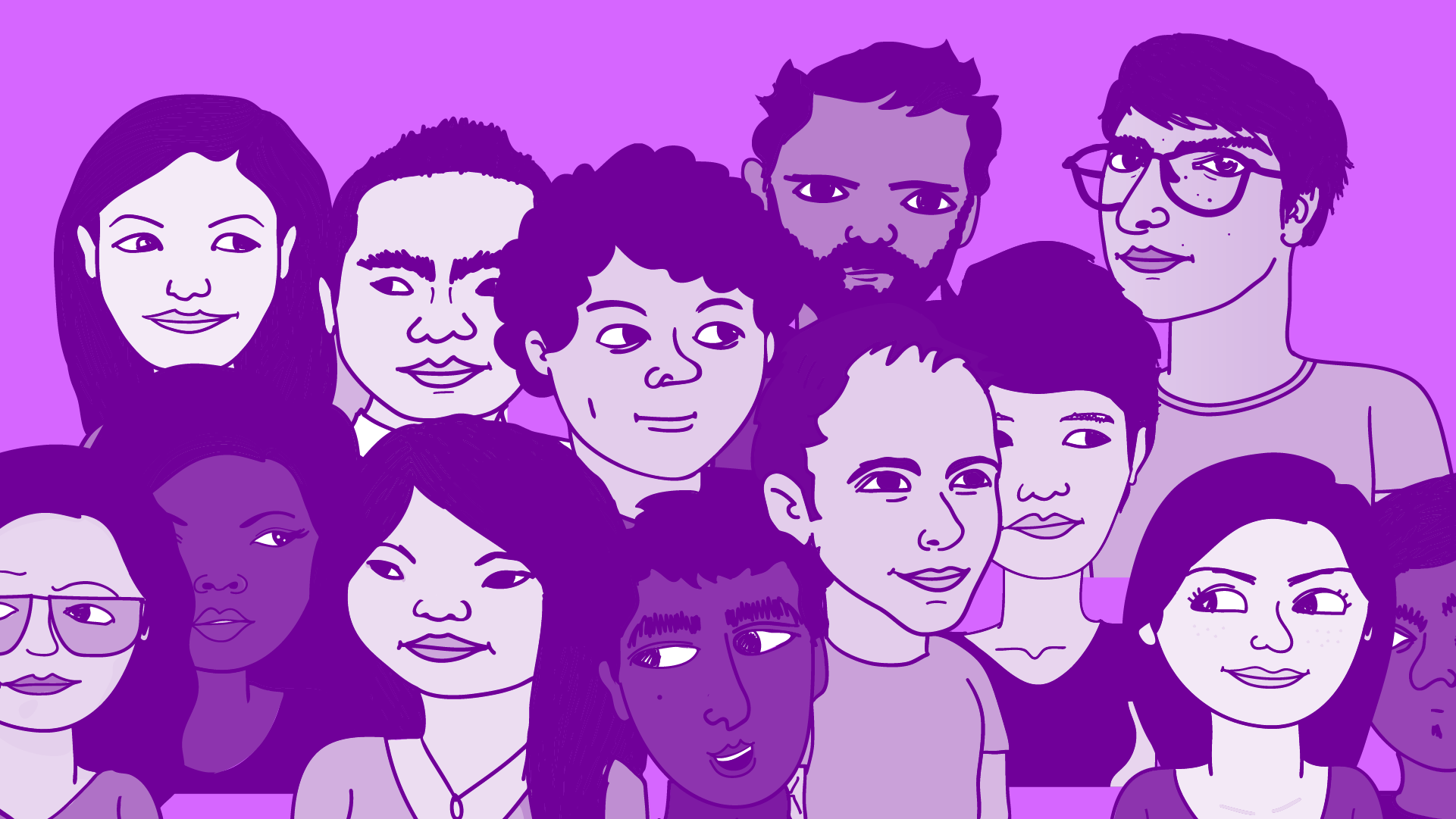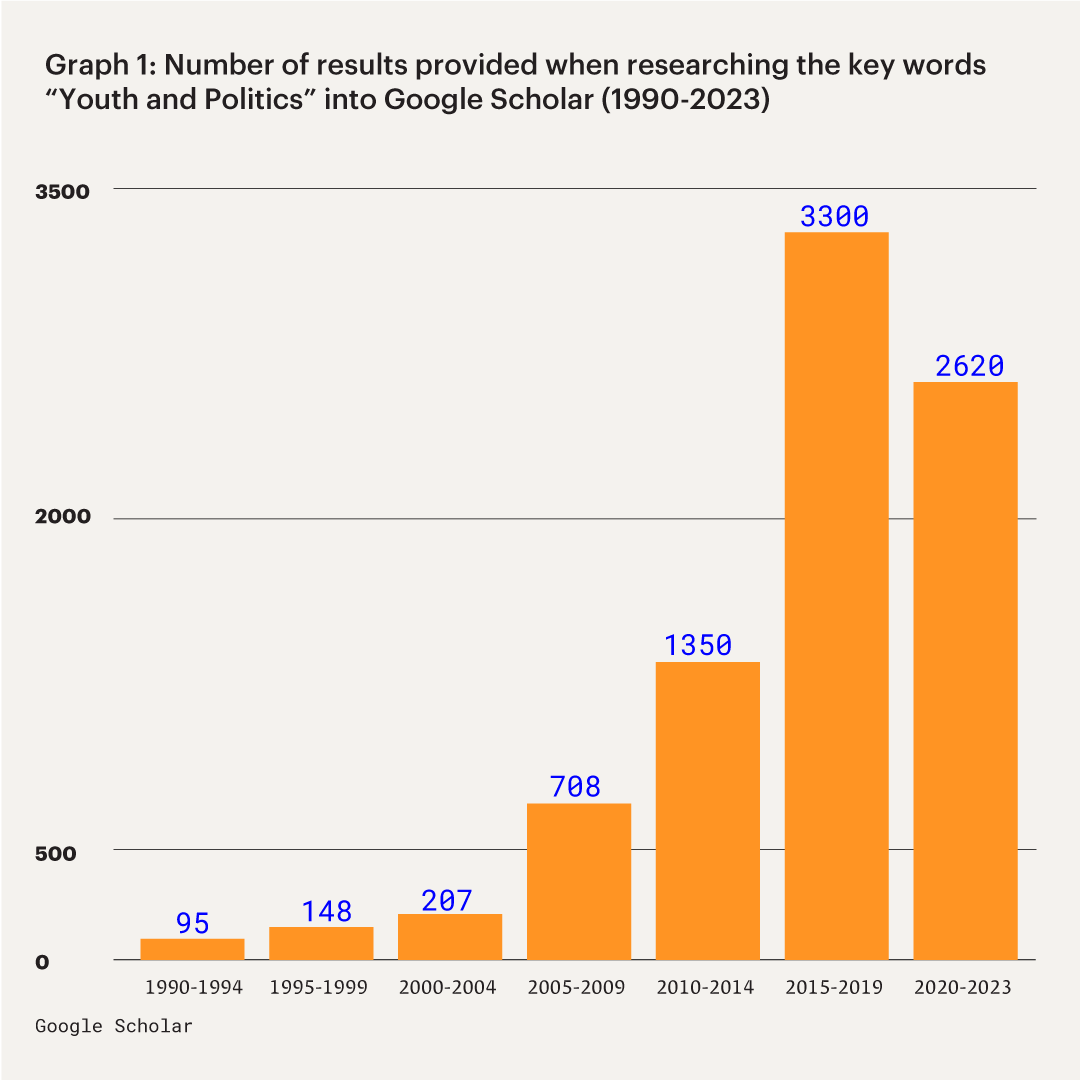
A genealogy of youth surveys: Why so many and why so often?
To paraphrase the title of a reference article that looks at the slow presence of women in politics,1 perhaps never before in Greece have we had so many and so frequent (and significant, I might add) studies on young people and the young generation. A search on the Google Scholar index of the keyword “youth and politics” (see Graph 1) yields just 95 results for the 1990-1994 period, 148 results between 1995 and 1999, 207 results for 2000-2004, 708 for 2005-2009, 1350 for 2010-2019, 3300 for 2015-2019 and 2,620 results from 2020 to the present date. Beyond any methodological limitations and objections regarding the accuracy of the results that the above-mentioned search offers, the numbers certainly suggest a dynamic that has to be reflected on a national level in terms of produced articles, ongoing public debate and relevant interventions.

Graph 1: Number of results provided when researching the key words “Youth and Politics” into Google Scholar (1990-2023)
Source: Google Scholar
Is there a “milestone” that triggered interest in this field either as a temporal juncture or a political event? The data in Figure 1 lead us to the assumption that the five-year period between 2005 and 2009, with 2008 as a milestone, was probably the catalyst for this phenomenon. Indeed, what is now known as “December of 2008” seems to have acted as a starting point for new scientific and research production in universities, research centres, think tanks, etc.
This phenomenon continued and culminated during the term of the SYRIZA-ANEL government, as both the mass mobilisations in town squares during the passing of the Memoranda, and the electoral behaviour of young people in the elections from 2012 onwards, as well as in the referendum of July 2015, led to a shift of the public interest towards young people (e.g. the article by Pantelidou Malouta and Zirganou Kazolea in this special feature, as well as Pantelidou Malouta, 2015). Thus, with the risk of sounding reductive, we could argue that in the field of analysis of political and electoral behaviour, up until 2008, age was mainly considered as a demographic variable rather than a distinct social category, and the actual shift in interest towards youth or young people as a distinct field of analysis, is a product of the last 15 years.2
This is by no means a Greek novelty. It reflects a general shift in the public debate and can, to a large extent, be attributed to factors that point to the impact of the international conjuncture: the global economic crisis that broke out in 2008, the major mobilisations that took place worldwide, but also the socio-demographic changes of the 21st century related to young people, such as: (a) their proportionally lower participation in the electorate, as a consequence of the ageing of the population on the one hand, and of the fact that a larger percentage of older people go to vote, on the other; (b) the fact that they reach certain milestones of adulthood (living alone/ owning a home, marriage, family, steady employment) later than previous generations – milestones that are also linked to political participation, and c) the sweeping changes in employment status (the generation with the highest qualifications and the highest unemployment rates) are affecting people worldwide, transcending national borders and, therefore, are of great interest within the field of research.
From the “Polytechnic generation” to the Millennials and GenZ: from the national event to the “global” generation?
The traditional approaches and youth (and generational) studies, when referring to the socialisation dimension of the concept of generations, used major socialising events related to Greek politics and society as a benchmark and/or a reference point. Following the political transition of 1974 (“Metapolitefsi”), in scientific research, as well as in journalistic and public discourse, there were references mainly to the “1-1-4 generation”, the “Polytechnic generation” or the “Metapolitefsi generation”, while various research initiatives later on cited and referred to other domestic political events.
Indicatively, these include the rise of PASOK (Panhellenic Socialist Movement) to power in the now regarded as a classic study on “the adolescents of Change” (Pantelidou, 1991), certain mobilisation processes in which young people played a leading role, such as the “generation of the ‘90-‘91 school occupations” (Sklavenitis, 2016) or that “of the events of December of 2008”, while in the periodisation introduced by Martin (2004: 191) in her comparative study of Greece and Spain, it is the national (event) that names each generation. About a decade ago the term “the 700 euro generation” was introduced in analyses (see Chiotaki-Poulou and Sakellariou, 2010 on how this group was constructed), but not long afterwards its use phased out.
In the last decade or so, as the interest and references to young people have increased, the terminology changed accordingly, and the terms “Millennials”, initially, and “Gen Z”,3 shortly afterwards, emerged dynamically in the domestic discourse as identifiers of the younger generations, thus marking a significant shift in the way these were perceived. Domestic (national) identities no longer appear to suffice, as the globalisation of issues and crises led to a globalisation of identifications and identities. The still unanswered question that is probably trickier to answer, is whether these younger generations also self-identify in more globalised terms compared to the older ones.
There are certain obvious similarities on a cultural, economical as well as technological level that come to mind when addressing this question. Starting from the latter, all the major technological innovations on the field of the Internet that have happened so far during the 21st century -which conventionally are included in what we call “Web 2.0”- have also become available and have thrived in Greece in the past decades. Major political, economic and social events that change the way we perceive and experience our everyday lives (the global economic crisis, refugee flows, the pandemic, the environmental crisis) are disconnected from the “national” sphere. Everyday habits and practices, such as trading in a single currency or travelling without border controls, all form a sense of globalised experiences.
Indicatively, according to a recent survey by the “National Centre for Social Research” (EKKE) conducted amongst young people aged 18-29, aiming to find out which personal experiences have influenced them personally in connection to the EU, “free travelling within the Schengen area” is the most important experience for young people today in terms of their perception of the EU, followed by the “common currency” (Iliou, Kakepaki and Klironomos, 2022: 21). Findings from an earlier EKKE study (Iliou and Kakepaki 2021) that sought the most impactful socialising “event” for individuals born between 1991 and 2003, show that it is mainly personal and family-related experiences that ultimately shape young people’s political identity, thus confirming the ever-present significance of the individuals’ political socialisation process within the family versus the effect that major political events might have on them.
Conclusions
In this brief note we have briefly recorded some key developments in the evolution of public and scientific discourse regarding the concept of the new generation and young people. Although not always explicitly stated, an approach to young people is gradually being shaped not so much as an age group or a biological/evolutionary category, but rather as a social group with generational attributes. However, this shift, having taken place over the last 15 years or so, has focused more on the last two generations, the Millennials and GenZs. In other words, it accepts the relevant classification that was formulated and widely adopted in the US, as a continuation of previous classifications (Silent generation, Baby Boomers, Gen X) that were based on demographic, social, political and cultural developments in the US.
At the same time, previous attempts to classify relevant research in Greece, with references to domestic -mainly political- developments [e.g. the (enter-political-event-here) generation: the “Resistance”, “1-1-4”, “Polytechnic”, “Metapolitefsi”, “Change”, “School occupations’”, “December of 2008” etc. generation] are gradually receding. In other words, a 70-year-old person today is highly unlikely to self-identify as a “boomer”.4 In contrast, identifying with GenZ seems to be the obvious choice for today’s 16-year-olds. Putting aside any communication-media influences and/or an identitarian cosmopolitanism, we suggest that this shift rather marks the receding importance of (domestic) politics in the shaping of political identities.
Therefore, the major events that will define and accompany each generation as determinants in future analyses cease to originate and be generated endogenously. Therefore, if in an earlier research we commented that “it is not easy to determine whether […] the generation of people born after 1991 has not (yet?) experienced its own student uprise at the Polytechnic School, its own Metapolitefsi or Change” (Kakepaki 2020: 7), today we would take this reflection further by arguing that, possibly, the events that define the younger generation are beyond the boundaries of the “national”. As a consequence, events that are shocking at first and seem to be engraved in the memory of younger people (e.g. the Tempi train accident) are not that likely to function as major political identity shaping events.
As a postscript, we would add one more thing: any study of the new generation -whatever what we may call it- should try to discern whether the attitudes and perceptions of individuals will accompany them for the rest of their lives, determining who they are, regardless of the age group they belong to. To do this, however, the focus needs to be on the whole population and over a sufficient time period in order to provide the necessary answers.
Otherwise, any study that is carried out will undoubtedly only be fragmentary.
Bibliography
- Iliou, Κ. and Kakepaki, Μ. (2021) “YouWho?”, https://doi.org/10.17903/FK2/M1YBXE Data List SoDaNet, First edition
- Iliou, Κ., Kakepaki, Μ., Klironomos Ν. (2022). Youth And Europe: Identity, Goals and the Future Of Europe. Final Report. EKKE – GS VETLL&Y
- Kakepaki, Μ. (2020) Impactful political events of a generation. Research conclusions of the YouWho? Survey. Athens: EKKE. DOI: 10.13140/RG.2.2.15817.57444
- Pantelidou-Malouta Μ. (1991). The adolescents of “change”: Socialising effects and transformations in adolescents’ political profile: 1982-1990. Social Sciences Review, 80, 41–69.
- Pantelidou-Malouta M., & Zirganou-Kazolea L. (2020). “The young Greek voters of the Left and radicalism during 2010s”, Greek Political Science Review, 46, 148–182.
- Sklavenitis, D. (2016). “Katse kala Gerasime”: Student’s movement and squatting, 1974-2000.
Athens: Asini - Chiotaki-Poulou E., & Sakellariou A. (2010). The Social construct of the “700 euro generation” and its emergence in the daily Press: A sociological approach. Social Sciences Review, 131, 3–32.
- Martín Cortés, I. (2004). Significados y orígenes del interés por la política en dos nuevas democracias: España y Grecia. Thesis (Doctoral). Instituto Juan March de Estudios e Investigaciones, Centro de Estudios Avanzados en Ciencias Sociales, Universidad Autónoma de Madrid.
- Christmas-Best, V., & Kjaer, U. (2007). Why so few and why so slow? Women as parliamentary representatives in Europe from a longitudinal perspective. Democratic Representation in Europe–Diversity, Change and Convergence, 77-105.[↩]
- With the exception of a handful of researchers, with Pantelidou Malouta being the most prominent amongst them, as she has systematically included the term of generations and the significance of political socialisation in her work for decades now.[↩]
- Although there is no definite consensus as to the first use of the terms “Millennials” and “GenZ”, the Pew Institute’s analyses, focusing on the different generations in the US for almost two decades now, has certainly contributed to the terms’ more extended use.[↩]
- It is rather telling that the expression “boomer” nowadays seems to collectively describe all those who do not belong to the younger age groups.[↩]



